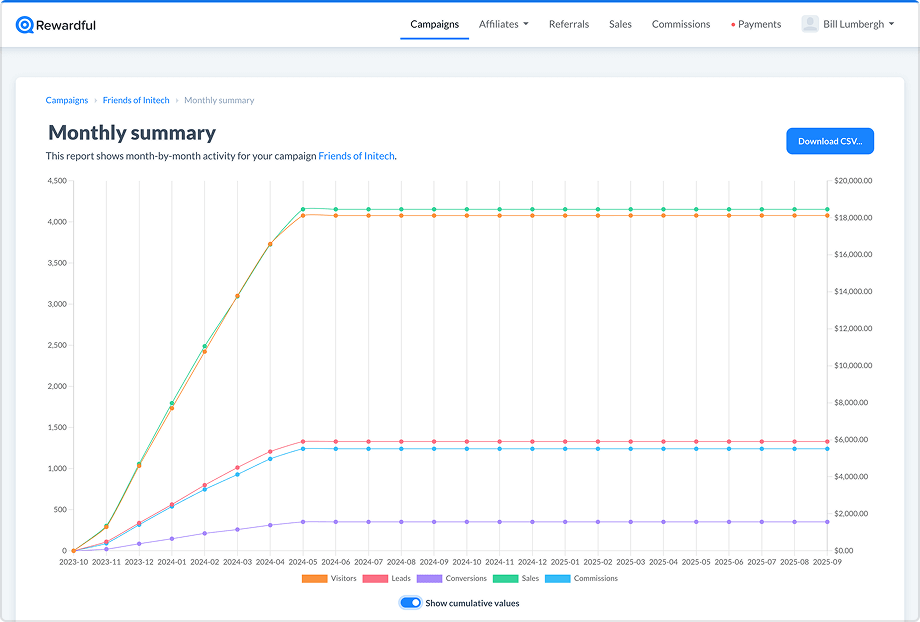Affiliate marketing has come a long way. From its humble beginnings in 1989, when William J. Tobin, owner of PC Flowers & Gifts, filed the patent for his affiliate program to where it is today – a lot has happened. Yet, the essence of affiliate marketing is still the same.
It has steadily grown from a niche online advertising strategy to a must-do marketing tactic. Affiliate marketing is the one type of 'promotion' that truly aims at building bridges between brands and consumers, and redefining relationships, interactions, and transactions within the digital commerce ecosystem. It's one of the most human forms of marketing.
But humans evolve, and so does the technology used for affiliate marketing. There are a lot of affiliate marketing trends to catch up on and watch out for, and we've compiled them all in this article.
Let's start with a brief overview of affiliate marketing before delving into the affiliate marketing trends that you need to know and jump on.
What is Affiliate Marketing?
Affiliate marketing is a performance-based advertising model that has rapidly grown due to its effectiveness and scalability. Brands partner with affiliates, ranging from websites and blogs to social media influencers and content creators, to promote their products or services.
These affiliates then earn a commission for every customer they refer to the brand through their promotional efforts.
Affiliate marketing thrives on transparency, mutual benefit, and trust between affiliates and their partner brands. It works because consumers trust recommendations from other people more than they trust ads from brands.
Related: Read our Affiliate Marketing Glossary to Learn All the Terminology
1. Micro-Influencers are Getting Bigger
Smart brands are no longer solely interested in influencers with a huge following. It's all about engagement, dedication, and community. And that's often found in the world of micro-influencers—those with a few thousand to tens of thousands of followers.
These influencers might have a smaller following, but the people following them interact with them more, and trust their recommendations more. Their content is highly tailored to what their audience wants, and you'll rarely see them promote something that seems slightly odd for their style. As a result, they can generate conversion rates that often surpass those of larger influencers.
Similarly, niche markets are becoming more fertile grounds for affiliates. Niches allow affiliates to target specialized audiences with pinpoint accuracy, using content that resonates deeply with these consumers.
It's the resurrection of quality over quantity. Brands recognize this approach's value and will look for more meaningful partnerships instead of marketing to the masses.
2. Regulations are Getting Tighter
As affiliate marketing gains popularity and becomes more mainstream, regulatory bodies worldwide are paying close attention.
Increased scrutiny and enforcement of rules and regulations are the order of the day, particularly regarding disclosure of brand-affiliate relationships and honesty in advertising.
Consumers need to understand what they're viewing, which means brands and affiliates need to put openness, transparency, and adherence to ethical marketing practices front and center.
With this ‘trend’, brands and affiliates are reminded to double down on keeping it real with consumers, which will only increase trust.
3. Affiliate Links are Reaching Video Content and Podcasts
Show, don't tell – the principle that'll always work best when recommending something to others.
Video content is growing bigger by the day, and affiliate marketing is latching on. Influencers are leveraging platforms like YouTube, Instagram, and TikTok to create engaging video content that showcases products and brands in an authentic and relatable way. For many products, this works better than blog posts or social media captions. People like to see a product in action, preferably in short, snappy content.
If you haven't already, start looking for affiliates skilled in video content creation who can reach and engage their target audience more effectively.
Similarly, podcasts are becoming increasingly important for online affiliate marketing trends. Consumers are tuning in to their favorite shows regularly, and there are plenty of podcasts for virtually every niche. It could be a great way for brands to expand their reach and showcase their products in a different setting than what consumers are used to.
4. Live Shopping is Becoming More Widespread
Taking video content a step further: live shopping is on the rise, and smart affiliate programs rise with it.
Live shopping is already a huge affiliate marketing trend in countries like China. On various digital platforms like Twitch, influencers or hosts can engage with their audience in real-time while showcasing products, answering questions, sneaking in discounts, and, of course, sharing affiliate links.
It's the modern-day Tell Sell, where the cheesy presenters have made way for actual experts who truly use the products they promote.
With the right influencers in front of the camera, brands can truly offer immersive experiences for their audience, and be right on top of any doubts they have.
5. Affiliate Tracking is Becoming More Data-Driven
If you're not digging into your data yet, you're leaving profits behind. Affiliate tracking platforms are becoming better and better at providing users with detailed insights into key metrics and affiliate marketing statistics, such as click-through rates, conversion rates, and return on investment. At the same time, affiliates get valuable insights, too, meaning both parties can optimize their strategies.
Tracking platforms can also help detect fraudulent activities, making it easier than ever to keep programs transparent and fair.
An affiliate tracking platform is more than just a means to an end – picking the right affiliate software and leveraging its analytics and reporting tools can truly transform your campaigns.
6. AI Makes its Way Into the Affiliate Marketing World
AI is everywhere, and the world of affiliate marketing can't hide from it either.
Luckily, it's a good thing. AI can enhance various aspects of affiliate marketing, from identifying potential affiliates to optimizing marketing campaigns.
AI-powered tools can analyze large volumes of data to identify trends and patterns that humans might miss or spot too late after they're most relevant. This will help affiliates make spot-on content, target the right people, and boost conversions.
On top of that, AI is increasing the possibilities for automation — from automating email campaigns to managing affiliate payouts; this can save significant time and resources. With all that extra free time, brands and affiliates can focus more on engaging with customers and perfecting their strategies in other ways.
7. Co-Marketing Means Affiliate Partners Collaborate More
Affiliate marketing isn't a competition – doing it right, means collaborating. It's great to see how affiliates are increasingly recognizing the power of working together, and it's leading to some creative campaigns.
By setting up co-marketing partnerships, affiliates can cross-promote each other's content, broaden their reach, diversify their audience, and maximize their earning potential.
Comarketing partnerships can take many forms. One content affiliate, who usually rocks at blogs, can partner up with a video creator, creating a comprehensive marketing campaign that works on multiple channels.
8. Voice Search is (Still) Growing
Alexa and Siri as affiliate partners? Why not!
While voice search hasn't taken off as much as promised yet in previous years, it does deserve to be mentioned. No, there's no massive spike in its use, but it's growing steadily, making it one of the more reliable trends to keep an eye on.
Voice-operated searches are found in more and more households, and people are adapting to using them. And the combination of smart speakers and smartphones for online searches reveals huge potential for affiliate marketing.
If you're a bit in the dark about how to implement voice search in an affiliate marketing campaign, let us shine a light on it: affiliates can optimize their (written!) content for long-tail keywords that people are likely to use in voice searches. After all, voice search scours the web, so it's all SEO, as we've all known it. Creating engaging, informative content that answers common questions can help affiliates rank higher in voice search results (and, of course, regular search results).
9. Affiliate Marketing Meets the Metaverse
Since the meta launch, it’s gained a large popularity among various users.
The metaverse has quickly become a platform with thousands of potential customers waiting to be engaged. Though it's still not widely adopted, there's a rise in big brands putting products in the metaverse and taking affiliate marketing with them. By promoting your products there, you can provide unique experiences that blur the line between reality and virtual reality. It’s a great way to engage with audiences in new and exciting ways.
However, it’s important to note that affiliate programs in the metaverse operate differently since they are geared towards better user experiences, behavioral tracking, creative ideas, and sometimes even virtual currencies. Rewards for affiliates vary based on the specific platform they inhabit within the metaverse.
The Future of Affiliate Marketing
Which one of these affiliate marketing trends has caught your eye and is going on the to-do list?
The future of affiliate marketing is brimming with potential and new opportunities. Affiliates get to be more creative, and brands that allow and encourage this will reap the results.
If you want to get started leveraging these trends, check out our tool and tracking possibilities to optimize your campaigns from day one.
Frequently Asked Questions
What is Affiliate Marketing?
Affiliate marketing is a performance-based advertising model. Brands team up with various types of affiliates to promote their products or services. These affiliates earn a commission for each customer they refer to the brand through their promotional efforts.
What are the Types of Affiliates to Consider Working With?
If you want to benefit from affiliate marketing, it's important to carefully select and manage your affiliates. This starts with understanding the different types of affiliates available:
- Micro-influencers
- Creators on content monetization platforms
- Charities and non-profit organizations
- Bloggers and publishers
- Email marketers and newsletters
- Mobile apps
- Coupon and deals websites
- Brands in your niche (or in a niche that's relevant to yours)
- Podcast and video affiliates
- Ranking and review websites
Read more about the types and use cases.
What is the Best Tool for Affiliate Marketing?
Affiliate software is designed to simplify the process of running an affiliate program. To choose the best tool for affiliate marketing, businesses should consider an affiliate management tool that simplifies and automates processes. The ideal solution should offer features like affiliate link generation, sales tracking, commission management, affiliate dashboards, reporting and analytics, and payment processing.













